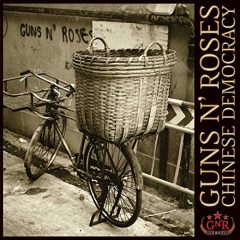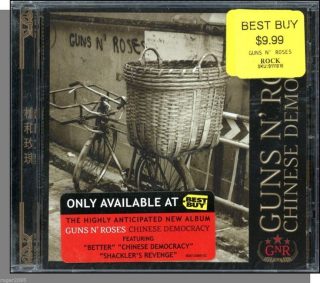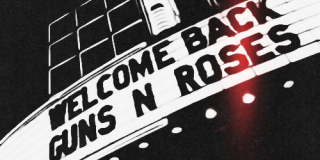
For rock fans in Generation X and in between GenX and Millenials (of which I fall into), it was a punchline.
Chinese Democracy was the album that was never ever going to be released, until one day in November 2008, the 23rd to be exact, there it was: The long awaited Guns N’ Roses album that no one ever thought would be heard by anyone other than the reclusive Axl Rose, who was behind the machinations of the delays and the album’s eventual release.
Nine years after it’s eventual dissemination, I don’t think it ever gets nearly the credit and much more criticism than it deserves. Therefore, this is my defense of Chinese Democracy by Guns N’ Roses.
First, let’s put Chinese Democracy into perspective as an album. Before its release, the last album was The Spaghetti Incident? from November 23, 1993, but that was an album of covers. The last studio album of original songs was the massive double release of Use Your Illusion I and II over two years prior on September 17, 1991.
But the last release of anything remotely related to the original Guns N’ Roses lineup was a cover of the Rolling Stones’ “Sympathy for the Devil” that appeared in Interview with a Vampire, which was released as a single in December 1994.
I won’t get into the actual breakup – that is another post altogether that I don’t have any interested in reading. Anyway, based on both Slash and Duff’s autobiographies, it seems like a lot of he said-he said, with much of the blame being on Axl. So let’s just move on.
The album that would become Chinese Democracy was started with small bits of recording all the way back in 1994. It would eventually be recorded in at least three studios and have at least four producers that we know of, but the band was about to change.

Original Guns N’ Roses Line up
Gilby Clarke was the first to go, leaving in 1995 and before that last single. Slash officially quit the band in October 1996, and was soon followed by Matt Sorum and Duff McKagan in 1997. At this point only Dizzy Reed and Axl Rose himself were left from the Use Your Illusion lineup. I’m not going to get into the dates, but let’s just say that in between 1995 and the release of Chinese Democracy in 2008, in one way or another the following names were a part of Guns N’ Roses: Buckethead, Robin Finck, Richard Fortus, Frank Ferrer, Josh Freese, Bryan “Brain” Mantia, Chris Pitman, Tommy Stinson, Ron “Bumblefoot” Thal, and Paul Tobias.
And of all of them, the original lineup for the start of Chinese Democracy was Finck, Freese, Pitman, Reed, Stinson, Tobias, and (of course) Axl Rose. But that was in 1997, some 10 years before the actual release of the album.
Also in 1997, Todd Sullivan, a talent executive for Geffen, sent Axl some CD’s to encourage Axl to find a producer for the project. Sullivan is said to have received a call saying that Axl ran the CD’s over with a car. At this point, the recording was still disjointed, and Sullivan again tried to get Axl to bear down and complete some songs. The next day Sullivan was removed from the project. Easy come, easy go.
Two years later in 1999, the single “Oh My God” was released with the End of Days Soundtrack, and the lineup on that was already different featuring the lineup I previously mentioned along with Gary Sunshine, Sean Riggs, and Dave Navarro.
Then came the delays… And there were many. We don’t know too much about this period because many of those involved signed a confidentiality agreement with Axl. But we do know from some sources that it wasn’t that much of a collaborative effort.
Back to before Slash left the band, he said in hindsight, “It seemed like a dictatorship. We didn’t spend a lot of time collaborating. He’d [Axl] sit back in the chair, watching. There’d be a riff here, a riff there. But I didn’t know where it was going.”

A digital audio tape
What we do know from some reports is that the archive of material recorded had created a library of more than 1,000 digital audio tapes, as well as a list of roughly 20 songs on an A list and 40 more on the B list.
Also in late 1999, Axl invited Rolling Stone to preview a dozen tracks. Following the preview, Rolling Stone reported the album might be “loosely scheduled” for release in the summer of 2000. But again, due to delays, drummer Josh Freese and an engineer working on the project, Billy Howerdel, found time to start their own band, A Perfect Circle, and the subsequent album “Mer de Noms.”
Enter Roy Thomas Baker next, who had worked with Queen. Baker decided that much of the work that had been done needed to be redone. Then, enter new guitarist Buckethead and new drummer Brian “Brain” Mantia, who were also directed by Axl to re-record all of the work that had been done by their predecessors.
In 2000, Axl Rose told Rolling Stone that some of the delay was due to him “educating himself about the technology that’s come to define rock,” saying, “It’s like from scratch, learning how to work with something, and not wanting it just to be something you did on a computer.”
At this point it’s important to note that Geffen A&R man Tom Zutaut said the record “could have been out for September 2002.” That too, proved to be another deadline that came and went. In August 2002, Rose released a statement on the website saying, “We feel that we have clarity as to the album we’re trying to make, we’re wrapping it up. We’ve sorted it down to what songs are on the record, what the sequence of the songs is. The album art is ready.”
Then in November of that same year, Dizzy Reed said the album could be expected by June 2003. This started a litany of unrequited release dates. Rose informally told an editor from antiMUSIC that he wanted “to make sure it is as perfect as possible before it is released.” And by June the band was re-recording the material again.

Axl Rose with Tommy Stinson
Then, after Buckethead left the band in March 2004, a statement was issued saying a release day was eminent, something echoed by bassist Tommy Stinson who claimed the album would be mastered in November 2004.
But by 2005, Chinese Democracy wasn’t even on the Geffen release schedule. In 2006, Rolling Stone claimed that they had word of a “firm” release date for November 21, 2006, but on December 14, 2006, Axl Rose wrote “An open letter to the fans from Axl” where he cancelled some dates and tossed blame around before giving fans a new tentative release date of March 6, 2007. A pushed release date of Christmas 2007 was given to the press by Skid Row’s Sebastian Bach, but 2007 came and went with no release.
And so we come to 2008. In March, Dr. Pepper offered a free can of their soda to everyone in America, excluding Buckethead and Slash if the band released Chinese Democracy in 2008. While the album would eventually be released during the year, the online distribution of coupons was less than stellar and a lawsuit was started. In June, nine tracks were leaked by music blogger Kevin Cogill and another lawsuit was started.
But eventually, November 23, 2008, came and the album was actually released. But despite that, it’s worth mentioning that China banned the album and electronic musician Ulrich Schnauss sued the band for copyright infringement. What’s another lawsuit to a record that cost in excess of $13 million (that we know of) and took the better part of 14 years to come to fruition?
Is it any wonder that the album became a running joke? But with its release, it was time to put the jokes aside and listen to what it contained.
Before I get into the reception, let’s look at perspective, this time in terms of the climate surrounding rock music. When the album had started its first recordings back in 1994, the music industry was the big bad music industry controlling marketing through music chain stores, radio play, and MTV video rotations.

Chinese Democracy Best Buy Exclusive
In the years since then, Napster had changed and toppled the industry as it was, grunge had come and gone, and the bands that once toured with the original Guns ‘N Roses were on their second or third “reunion tours.” The landscape had indeed changed, but to quote Joe Perry, “Let the music do the talking.”
And it spoke volumes.
The critics were all over the board; Rolling Stone and AllMusic rated it 4 out of 5 stars, The A.V. Club offered an A-, The Guardian and Mojo delivered a 3 out of 5 stars rating, MSN Music scored it with a B+, Pitchfork gave it 5.8 out of 10, Q marked it with 2 out of 5 stars, Slant Magazine halved it with 2.5 out of 5 stars, and Spin awarded it a 7 out of 10. Every imaginable term was thrown at this album, from “a test for contemporary ears” to “timeless” to “exhausting to listen to” and even “a grand disservice.”
Former band members were just as divided. Tracii Guns said it was “over-indulgent, sterile and not that exciting.” Matt Sorum called it a “toe-tapper.” Izzy Stradlin said, “I like what I’ve heard.” Gilbey Clark said, “I think it’s a really good record.” Duff said, “Axl sounds amazing,” and “I think Axl’s finally made the record he always wanted to.”
But the most quotes you find are from Slash, who reporters flocked to for comment. In various interviews Slash said, “That sounds cool. It’s good to hear Axl’s voice again, y’know?” and “It’s a really good record. It’s very different from what the original Guns N’ Roses sounded like, but it’s a great statement by Axl… It’s a record that the original Guns N’ Roses could never possibly make. And at the same time it just shows you how brilliant Axl is.”
Now that we’ve heard from the critics and former band members, let me state my defense for the album.
First, let me state the brilliance of Axl’s mixing the title track to have a 40+ second build up for an album where people were waiting to hear what it would sound like. That’s just Axl’s sense of humor, I guess, leading into a guitar riff and the first lyrics off the album being, “It don’t really matter. You’ll find out for yourself.”
This album is exactly what it should be. It’s a clear and obvious linear progression from Appetite to Use Your Illusion to Chinese Democracy. I can’t hear it any other way. “Street of Dreams” is heir apparent to the epic songs off of Use Your Illusion such as “November Rain” and “Estranged.” “Madagascar” has a breakdown eerily reminiscent of the intro to “Civil War.”

Lyrically, Axl is firing on all cylinders, and musically there are so many tracks on this album that remind me of Use Your Illusion that it could very well be Use Your Illusion III. And it’s well documented that Use Your Illusion I and II were much more grandiose because of Axl. It was under his influence that Dizzy joined the band on keyboards and they added in the big band sounds and pianos.
Those “epic songs” I mentioned earlier were all Axl. But there’s much more to this album than what once was. Axl was trying to find his way in the changing musical tastes that represent a cornucopia of sounds and genres that evolved continuously from the start of this recording in 1994 through its release in 2008. But none of that should surprise anyone when you hear the last track off of Use Your Illusion II – “My World” – which seems more proto-metal than anything else on the album.
I don’t understand all of the criticism and fervor thrown towards Axl because of this album. In the past four paragraphs, I think I’ve given the defense of this album that it deserves, but it doesn’t seem to be enough for most.
I’m not sure what to say to those who oppose the idea of me liking this album. Without the original lineup, we weren’t going to get another Appetite for Destruction, and we knew that was never going to happen. Even with the original lineup, they’ve all changed musically. Listen to Duff’s solo work or the stuff Slash did with Slash’s Snakepit and Velvet Revolver. Sure, they’re more rock in the vein of Appetite, but they weren’t aiming to recapture that lightning in a bottle. They’ve all grown as musicians, and there is nothing wrong with that.
Axl has done the same thing. Now, I’m sure the fact that he kept the name and kept on going with none of the other major players – Slash, Duff, Izzy, Matt, or Steve – still bothers purist fans, but that happened over two decades ago. It’s not part of the argument anymore, nor should it be. You could have been bitter about that back then, but not now.
Now, I realize, I’m writing this post in defense of the album, and to a similar extent Axl himself, and that the impossible nature behind the release of an album that took 14 years to come to fruition is also as improbable as the fact that Axl, Slash, and Duff are in fact touring as Guns ‘N Roses again.

Duff, Axl, and Slash together again
But none of that excuses the vitriol surrounding the release and reaction of some fans upon the release of the most expensive rock album ever recorded.
To be completely honest, I believe there are two types of Guns ‘N Roses fans. Those who like Slash and those who like Axl. Of course there is overlap, but by and large, those who side with Slash tend to like Appetite for Destruction more than Use Your Illusion and they don’t enjoy Chinese Democracy at all. Those who like Axl, (and I’m on both sides here) tend to see Chinese Democracy as an obvious next step musically from Use Your Illusion, a linear progression if you will.
And it’s paramount that Axl and Slash balance themselves out very well when they are collaborating. Use Your Illusion I and II are evidence to that. And if they ever do any more original recording together, the revisiting of that sound – the epic, melodic, hard rock – would be understandable. Will there be new material?
In 2006, Slash told Aerosmith’s Joey Kramer, “We all were pretty positive [the reunion] would never happen, so it’s still sort of blowing our minds…. But everybody’s really getting along great and I think everybody’s come a long way, and it’s all cool.”
Well, there have been small hints of another album, but let’s look at Slash’s point. First we never thought Chinese Democracy would ever see the light of day. Fourteen years later, it finally came out. Second, we never thought Axl and Slash would ever share the stage again, but even that has happened. So I wouldn’t count anything out.
The last thing you want to do is count out Axl Rose or Slash. So, let’s sit back and enjoy the music we have. And if we get another album to add to our playlists, all the better.
Let’s just hope that we don’t have to wait until 2022 to get it.
For additional commentary, please listen to Our Liner Notes Episode 77 to hear Chris Maier and I discuss Chinese Democracy from different sides of the discussion.